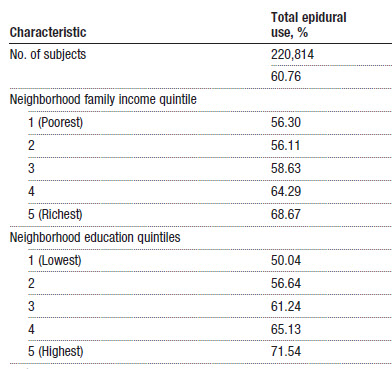Are we using our brains when it comes to epidurals?
 Friday, February 26, 2010
Friday, February 26, 2010 A 2009 study called Social disparity and the use of intrapartum epidural analgesia in a publicly funded health care system  by Ning Liu MB, MSc et al concluded that in Canada "the use of labor epidural analgesia is decreased with decreasing neighborhood economic and education levels." Or, in plain language: rich highly educated women are more likely to get an epidural than poor less educated women. Those are facts which are supported by an excellent data set. I won't argue with the facts [edited to add screen capture of basic results set].
by Ning Liu MB, MSc et al concluded that in Canada "the use of labor epidural analgesia is decreased with decreasing neighborhood economic and education levels." Or, in plain language: rich highly educated women are more likely to get an epidural than poor less educated women. Those are facts which are supported by an excellent data set. I won't argue with the facts [edited to add screen capture of basic results set].
However, I take issue with some of the study's assumptions and the conclusions drawn by some of the researchers involved. From the start, the study presents the use of epidurals as the smart choice, referring to the increased use of epidurals as "1 [sic] of the most significant achievements of modern obstetric practice." The whole study seems to question whether women of lower socioeconomic status are just not smart enough to understand how great epidurals are.
Education level could influence a patient’s acceptance of epidural analgesia.26 We speculate that in our study women from a high-education neighborhood may have had more knowledge about labor epidural and considered that it could alleviate pain more effectively. These women could then be more likely to accept epidural when clinicians recommended it to them, or they request the service themselves.
Despite conceding some cultural reasons for some women refusing epidurals, ultimately, they seem to conclude that if you are educated about epidurals you will make the smart choice and get one. If you are not educated about epidurals, you will not know what a wonderful thing you are missing out on.
The pros and cons of epidurals
 I think the first mistake the study's authors made was to assume that getting an epidural is a smarter choice than not getting an epidural. There are both pros ans cons to epidural use during birth. According to Sam Leeson, a doula with babyREADY in Toronto in her post on epidurals:
I think the first mistake the study's authors made was to assume that getting an epidural is a smarter choice than not getting an epidural. There are both pros ans cons to epidural use during birth. According to Sam Leeson, a doula with babyREADY in Toronto in her post on epidurals:
PROS
May offer pain relief
May offer mom the chance to rest
May be medically necessary
CONS
May not work the way mom wants
Mom will be unable to get up to urinate
Some moms complain of long-term back ache at the epidural site**
May slow labour
May drop mom’s blood pressure (an IV will be administered)
May increase the need for surgical interventions (i.e. vacuum, forceps, episiotomy and/or caesarean section)
Will increase the risk of tearing
May give mom a spinal headache
May affect the baby
May result in an allergic reaction to the narcotic (mom would need more medication)
Is cumulative (results in increasing physical disconnection the longer it is in place)
Limits options of positions for pushing in second stage labour
There is a detailed examination of the pros and cons of epidural use, giving a full explanation of these factors, in Weighing the Pros and Cons of the Epidural by renowned childbirth education expert Penny Simkin. In her article she concludes that:
The childbirth educator's duty is to inform, not to talk women into or out of using an epidural. Many women will choose an epidural, when well informed of benefits, risks and alternatives; others will choose to avoid it if their labor allows.
When women are well informed, they will consider the information, along with other factors - such as their fears, self-perceptions, their goals for their birth experiences, their support system - and make the most suitable decision.
This is a reasonable, balanced conclusion. Assuming that an epidural, which has many risks including increasing the likelihood of need for other birth interventions (each of which carries its own risk), is a better smarter choice is inappropriate. Assuming that the decision to refuse an epidural is something that only uneducated or unaware women do, is insulting.
A brief tangent on inductions, epidurals and c-sections
One of the key risks of epidurals that is mentioned above is the likelihood that an epidural will result in the need for additional interventions, like a c-section. But often the story doesn't start with the epidural. Experts say that a lot of women are induced unnecessarily just because they have passed an arbitrary date by which the obstetrician thought they should have given birth. In an article about Canada's increasing c-section rate, this logic is questioned:
Today in Canada, one in five women who gives birth in hospital is induced.
What doctors fear are stillbirths. But alarmed by the rising rates of inductions, the Society of Obstetricians and Gynecologists of Canada recently urged doctors not to consider an induction until a woman is at least one week past her due date.
Claudia Villeneuve says that women are getting induced "if they're two, three, four days overdue."
"Inductions are rampant," says Villeneuve, president of the International Cesarean Awareness Network of Canada. "You have a perfectly normal mom who comes in with a perfectly normal baby, and now you put these powerful drugs into her system to force labour to start."
The "humane" thing is to offer an epidural, she says. With an epidural, a woman can't feel pain in the lower half of her body. But epidurals slow labour, sometimes so much that labour stops. "Now you have to get this baby out," Villeneuve says. Two-thirds of first-time C-sections are done for "failure to progress."
Interestingly, despite this logical explanation for part of the increase in the c-section rate, one of the authors of the study this post is about (the one about how smart women get epidurals), Dr. Mark Walker, is quoted in the same article as saying that "We don't know what the ideal rate [of c-sections] is. I think it's fair to assume it's lower than where we are now." (note: the WHO says it shouldn't be higher than 15 percent and Canada's c-section rate is 29 percent).
An alternate hypothesis
Back to the epidural study. In addition to rejecting the authors' assumption that an epidural is a smart choice, I also reject their conclusion that education level is what causes women of higher socioeconomic status to have a higher epidural rate.
**WARNING: Evidently from the comments so far my attempt to facetiously poke fun at myself and my socioeconomic cohort in the next paragraph was a complete failure. Please take it with a grain of salt or feel free to join in telling me what a jerk I am while I ponder whether I want to keep writing at all if there is no room for a bit of sarcasm and creative license here and there to make a point (going to keep writing...and keep learning). **
Instead of saying that rich educated women are making the "smart" choice by getting an epidural, I'd be more likely to say that women with perfectly manicured nails, pretty shoes, and a white collar job in the city who have never done a day of manual labour in their lives or endured any type of hardship are more likely to be unwilling or unable to endure the pain of childbirth than rural blue collar working women with practical shoes, callouses on their hands and whose life experience has taught them how to fight and endure. That is, of course, a generalization since not all rich educated women chose to have epidurals and not all poor uneducated women refuse them. However, I think it is a more likely explanation for the difference in epidural rates across socioeconomic groups than the one the authors of the study put forth.
Or, if I am wrong and women of higher socioeconomic status are truly choosing epidurals because they think it is the smarter, safer choice, then we need to seriously reconsider how women are educated about epidurals and find ways to ensure more of them learn about the risks of epidurals and are given the confidence in their body's ability to birth a baby and to endure the pain of childbirth.
My experience: I had an epidural for my first birth because I was "educated" about the "benefits" of the epidural and scared of the pain. I ended up spending a very uncomfortable night, lying on my back, waiting for my baby to be born. I needed a nurse to tell me when to push and for how long. They had to use the vacuum extractor to get my baby out (and I'm very lucky that is all they had to use). For my second birth, I refused the epidural because I was educated about the risks of an epidural. I was able to labour in whichever position was most comfortable for me, which mostly meant standing up and using gravity to help move things along. I was able to feel when it was time to push and knew how long and how hard to push because my body told me and not because a nurse was counting for me.
Image credit: mangpages on flickr




















Reader Comments (104)
Candace, I believe (and if someone knows differently, please correct me) that "walking epidurals" are not available here in Canada.
I haven't heard that phrase. To clarify: To my knowledge I did not receive anything beyond the usual epidural. I was neither encouraged nor allowed to move and use the bar. Rather, my own freakish resistance allowed me to do so and I insisted on it.
This is very late into the debate - however, an alternative is that more educated women feel an affinity with the doctor, who is ALSO well educated - which creates a situation of trust, trust in your peer... People who go to university accept research as a basis for decisionmaking and assume that the doctor has "done their research." Really, if you are a well educated adult, going along with the establishment kind of makes sense, because well educated people tend to BE part of the establishment.
Thank you so much for this post! I am currently pregnant with my first child and do not want to be induced or have an epidural. I don't understand how you are meant to birth a baby when you can't feel what your body is doing? Yes, childbirth will be painful - but it is something that women have been doing for thousands of years and our bodies are designed to handle it. Nor do I want my baby coming into the world drugged. I feel that women are not educated in trusting their bodies and that their is so much scaremongering around pregnancy and childbirth that they see an epidural as an easy way out. Not for me. No thank you.